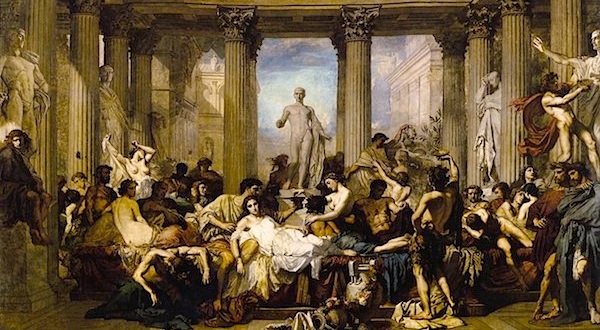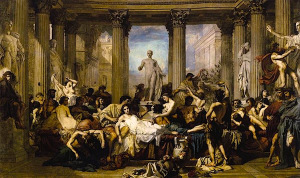
The Church Fathers, an 11th-century Kievan miniature from Svyatoslav’s Miscellany
The real followers of Jeshua, who got the apostles as their teachers or got sincere disciples of the pupils of Christ Jesus, did not celebrate any pagan festival and they objected to Christians joining in such pagan festivals.
As the writer of the reblogged article indicates it is not a coincidence that the Church Fathers decided on a time of year that was the time when the Roman world came together not only to celebrate a Pagan god but also to celebrate in a way that didn’t quite sit well with the value of the Church. The Church even complained when the festivities of the Saturnalia continued into the eighth century with the old Pagan values. For them it was in agreement for keeping their power and for not disturbing the market of attributes for the festivities. They thought by stealing a festival and re-brand it for their aggressively proselytising new religion, they thought to get more followers and
donors of gifts for their services. In a way by adapting everything to the region where they wanted to bring their own religion, they managed to lure many people in their church. at the same time the real followers of Christ got it more and more difficult and at many times even got to fear for their life, being considered heretics. Though the lovers of the Only One God, continued to spread their belief with of their rabbi Jeshua, and up to today everywhere in the world you still can find real worshippers of the One True God Jehovah, who have Jesus as their example and as the cornerstone of their church. They may be living in this world but do not want to be of this world and abstain from such pagan traditions as Christmas, Easter, Halloween, All Saints and All Souls. For them it are the days demanded by God which are celebrated and followed, not the ones of the established world church.+
Preceding article: Objects around the birth and death of Jesus
++
Find also to read:
- Messengers of Jesus will be hated to the end of time
- Called Christian
- Discipleship way of life on the narrow way to everlasting life
- Challenging claim 3 Inspired by God 2 Inerrant Word of God
- God’s forgotten Word 1 Introduction
- God’s forgotten Word 5 Lost Lawbook 4 The ‘Catholic’ church
- Not words of any organisation should bind you, but the Word of God
- People Seeking for God 6 Strategy
- Looking for True Spirituality 1 Intro
- How Many were Bought
- Being Religious and Spiritual 7 Transcendence to become one
- Being Religious and Spiritual 8 Spiritual, Mystic and not or well religious
- Missionary action paradigm for all endeavours of the church
- Something Most False Christians Have In Common
- Catholicism, Anabaptism and Crisis of Christianity
- Jesus begotten Son of God #1 Christmas and Christians
- Christmas, Saturnalia and the birth of Jesus
+++
Related articles
- Why Christmas is on December 25 (patheos.com)
Touchstone has reposted its most popular article, the scholarly treatment by historian William J. Tighe from 2003 about why the birth of Jesus is celebrated on December 25. And, as he definitively shows, it has nothing to do with any pagan festival.
From William J. Tighe via Touchstone Archives: Calculating Christmas
+
In the Julian calendar, created in 45 B.C. under Julius Caesar, the winter solstice fell on December 25th, and it therefore seemed obvious to Jablonski and Hardouin that the day must have had a pagan significance before it had a Christian one. But in fact, the date had no religious significance in the Roman pagan festal calendar before Aurelian’s time, nor did the cult of the sun play a prominent role in Rome before him.- Without Jesus Christ you can’t have Christmas: Letter (nj.com)
We keep thinking the next generation will have the answers to bring peace, love and salvation. Years ago I removed my faith from “the human spirit” and placed it firmly in Jesus Christ, the Son of God.- The Winter Solstice: Symbol of the Antiquity of European Civilization (davidduke.com)
The Winter Solstice is the day upon which, in the Northern Hemisphere, there is the least amount of daylight. This is because of the alignment of the earth on its axis, and its position relative to the sun.Conversely, the longest day of the year in the Northern hemisphere occurs on June 21, when the opposite alignment effect plays itself out.
In the Southern Hemisphere, exactly the opposite scenario plays itself out: the longest day is December 21, and the shortest day is June 21.
The importance of these days lies in the fact that they are directly in the middle of the seasons of winter and summer.
- The Winter Solstice: Symbol of the Antiquity of European Civilization (therebel.website)
When the Romans invaded Greece in the fifth century BC., they realized the advantages of a solar calendar, and in 153 B.C. the Roman New Year’s Day was moved to January first—the month being named after the two-faced god of doorways and new beginnings, Janus.In northern Europe, the Druids and Vikings built huge bonfires on hilltops on the longest night of the year, with the intention of giving additional strength to the sun god in his nightly battle with the forces of cold and darkness.
When the sun finally did come up a little earlier on the day after the solstice, there was a great celebration amongst these Northern peoples—the celebration of light over darkness.
These feasts would mark the fact that they had survived the winter, and would take the place of large feasts, gathered in halls with large log fires, accompanied by the exchange of gifts.
Thus the festivals around the Winter Solstice were well-established in Northern and Southern Europe many thousands of years ago.
The advent of Christianity in Europe, which only occurred in the south during the third century AD, and only reached the last part of Northern Europe around the year 1100 AD, saw the Church Fathers at first highly hostile to this clearly pagan festival.
Along with the pagan celebration of Spring (which celebrated the rebirth of life through the goddess Eostre, or Ostara, with her symbols of fertility being the egg and the rabbit), the Church Fathers at first south to stamp out the celebration of the Winter Solstice.
- Outraged vicar finds Easter chocolates on sale just TWO DAYS after Christmas (express.co.uk)
Father Tim Williams could hardly believe his eyes when spotted Malteasers’ MaltEaster bunny rabbit chocolates on the shelf at the Co-operative in Killay in Swansea, south Wales.
Father Williams posted a picture of the offending confectionary on his Twitter page, slamming the sale as “unbelievable”.
Easter Sunday is more than four months away – on April 5.
He captioned the image: “Unbelievable. Nowhere near finished celebrating Christmas and the Co-op in Killay are selling Easter eggs and bunnies.”
Father Williams said that he bought a bag of the treats “as an illustration of my rant against consumerism” during his Sunday sermon.
- Reason for the birth of Jesus Christ : He came for sinners (disciplesofhope.wordpress.com)
We know that the grace of God comes through Jesus to all those who believe in him. This grace is for sinners who turn their hearts and minds to the Lord Jesus. Here a sinner doesn’t have to earn his salvation because he simply cannot do so. In fact Jesus gives forgiveness of sins to those who repent in his name. Our Lord made it very clear that he came for sinners.
+
So whether it’s Christmas or Easter or whichever time you can think of do not get carried away by the glitz and dazzle that you will see around you. For those who want to celebrate with a good dinner and decorations there’s no prohibition only please do not sin in anyway. Eat and drink in moderation to the glory of God and not for men. However, in all your enjoyment at this time remember that you are celebrating the birth of the One True Saviour of the World and also remember that Christ will remain true to his purposes always.- Faith In Action ‘Life In Abundance’ (mylordmyfriend.com)
Christmas Time is a great time to reflect, why did Christ Jesus come? It certainly was not because he wanted to be born as a baby, but to show us that He came, to give us a new start, by being Born Again. Born of the Spirit, into to right relationship with Him and The Father and The Holy Spirit.Christmas is not about the baby Jesus, it is about why He came, take sometime to reflect.
- Advent: A Time of Preparation (lifeofsaintphilomena.wordpress.com)
I personally love Confession for any and all prep work. I love going to Confession before Mass, before something big in my life, before Easter, and especially before Christmas. We want our hearts to be pure dwelling places for the baby Jesus.- Special Christmas Verse For The Season (mylordmyfriend.com)
What a wonderful time of the year, the world celebrates Christmas, without really knowing what they celebrate. The celebration is about Christ Jesus being born as one of us, so we can be free from the power of sin. The birth is an expression of of God’s love, that Christ Jesus would come down from His throne of Glory, to be clothed in flesh like ours.- Handel’s Messiah (meredithlbl.com)
George Frederic Handel, a German composer, was a child prodigy. If a friend of Handel’s father hadn’t heard the eleven year old play the organ, his father would have educated him as a lawyer. This piece was composed for Easter. It’s now well ensconced as Christmas song.
Today we celebrate Christmas as a Christian festival, unfortunately commercialised by the West in more recent years. However, the falling of Christmas has fallen conveniently; in the same month as one of the highlights of the Roman calendar, Saturnalia.
Saturnalia was the 17th day of the month December in the Julian calendar, and celebrated the god Saturn. Later the festivities continued on up to the 23rd December (or Christmas Eve Eve to some of us!)
Thomas Couture captures Roman Saturnalia festivites that may look a familiar scene to modern readers!
“The Best of Days” (Catallus)
Saturnalia was a festival that many looked forward to, particularly slaves as it was the one day when they did not have to work and when they were treated to a banquet of the sort usually enjoyed by their masters. The day would begin with a sacrifice at the Temple of Saturn (in the Roman Forum)…
View original post 442 more words



Pingback: Why we do not keep to a Sabbath or a Sunday or Lord’s Day #3 Days to be kept holy or set apart | Free Christadelphians: Belgian Ecclesia Brussel - Leuven
Pingback: Looking for the consummation of presents | From guestwriters
Pingback: Winter Solstice 2015: Shortest Day Of The Year Celebrated As Pagan Yule | Stepping Toes
Pingback: A season for truth and peace | Belgian Ecclesia Brussel – Leuven
Pingback: Called Immanuel does not mean to be Jesus being God – Immanuel Verbondskind – עמנואל קאָווענאַנט קינד
Pingback: Paul’s warning about false stories and his call to quit touching the unclean thing | Belgian Biblestudents - Belgische Bijbelstudenten
Pingback: Thought for the Christmas time: A sense of history – Belgian Ecclesia Brussel – Leuven
Pingback: People believing they need to celebrate the birth of God | Bijbelvorser = Bible Researcher
Pingback: Today’s thought “Qualities and feasts of people” (December 14) – Belgian Ecclesia Brussel – Leuven
Pingback: Evergreen trees and Decorations with festive foliage | From guestwriters